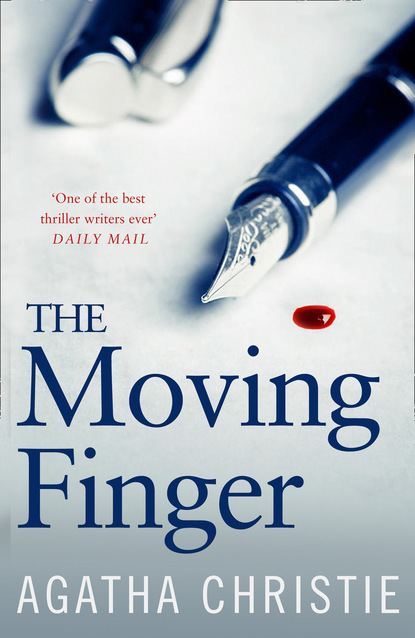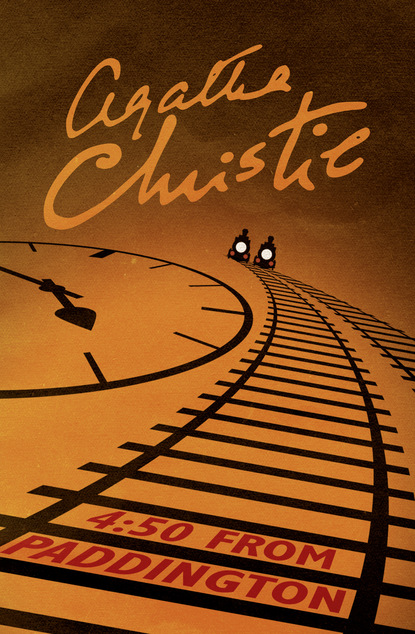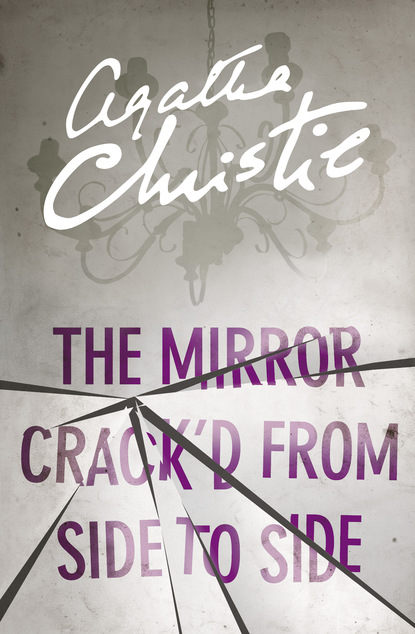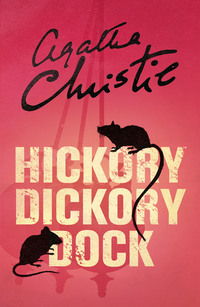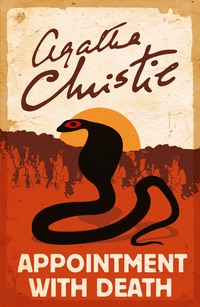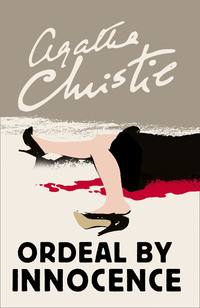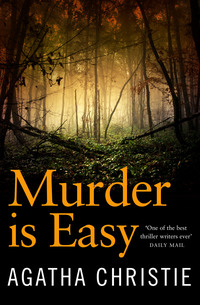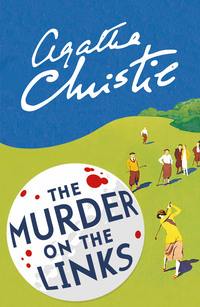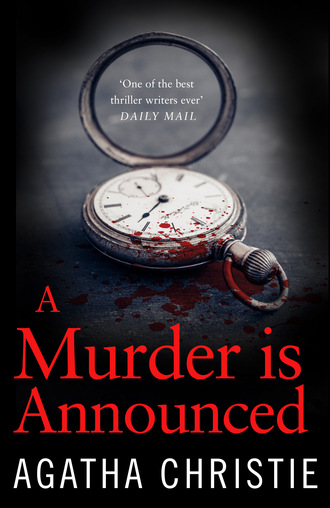
Полная версия
A Murder is Announced
There was an audible series of gasps. Julia gave an approving little giggle, Patrick crinkled up his face and Miss Blacklock smiled at her latest guest.
‘Julian is just frantic with rage that he can’t be here,’ said Mrs Harmon. ‘He adores murders. That’s really why he preached such a good sermon last Sunday—I suppose I oughtn’t to say it was a good sermon as he’s my husband—but it really was good, didn’t you think?—so much better than his usual sermons. But as I was saying it was all because of Death Does the Hat Trick. Have you read it? The girl at Boots’ kept it for me specially. It’s simply baffling. You keep thinking you know—and then the whole thing switches round—and there are a lovely lot of murders, four or five of them. Well, I left it in the study when Julian was shutting himself up there to do his sermon, and he just picked it up and simply could not put it down! And consequently he had to write his sermon in a frightful hurry and had to just put down what he wanted to say very simply—without any scholarly twists and bits and learned references—and naturally it was heaps better. Oh, dear, I’m talking too much. But do tell me, when is the murder going to begin?’
Miss Blacklock looked at the clock on the mantelpiece.
‘If it’s going to begin,’ she said cheerfully, ‘it ought to begin soon. It’s just a minute to the half hour. In the meantime, have a glass of sherry.’
Patrick moved with alacrity through the archway. Miss Blacklock went to the table by the archway where the cigarette-box was.
‘I’d love some sherry,’ said Mrs Harmon. ‘But what do you mean by if?’
‘Well,’ said Miss Blacklock, ‘I’m as much in the dark as you are. I don’t know what—’
She stopped and turned her head as the little clock on the mantelpiece began to chime. It had a sweet silvery bell-like tone. Everybody was silent and nobody moved. They all stared at the clock.
It chimed a quarter—and then the half. As the last note died away all the lights went out.
Delighted gasps and feminine squeaks of appreciation were heard in the darkness. ‘It’s beginning,’ cried Mrs Harmon in an ecstasy. Dora Bunner’s voice cried out plaintively, ‘Oh, I don’t like it!’ Other voices said, ‘How terribly, terribly frightening!’ ‘It gives me the creeps.’ ‘Archie, where are you?’ ‘What do I have to do?’ ‘Oh dear—did I step on your foot? I’m so sorry.’
Then, with a crash, the door swung open. A powerful flashlight played rapidly round the room. A man’s hoarse nasal voice, reminiscent to all of pleasant afternoons at the cinema, directed the company crisply to:
‘Stick ’em up!
‘Stick ’em up, I tell you!’ the voice barked.
Delightedly, hands were raised willingly above heads.
‘Isn’t it wonderful?’ breathed a female voice. ‘I’m so thrilled.’
And then, unexpectedly, a revolver spoke. It spoke twice. The ping of two bullets shattered the complacency of the room. Suddenly the game was no longer a game. Somebody screamed …
The figure in the doorway whirled suddenly round, it seemed to hesitate, a third shot rang out, it crumpled and then it crashed to the ground. The flashlight dropped and went out.
There was darkness once again. And gently, with a little Victorian protesting moan, the drawing-room door, as was its habit when not propped open, swung gently to and latched with a click.
Inside the drawing-room there was pandemonium. Various voices spoke at once. ‘Lights.’ ‘Can’t you find the switch?’ ‘Who’s got a lighter?’ ‘Oh, I don’t like it, I don’t like it.’ ‘But those shots were real!’ ‘It was a real revolver he had.’ ‘Was it a burglar?’ ‘Oh, Archie, I want to get out of here.’ ‘Please, has somebody got a lighter?’
And then, almost at the same moment, two lighters clicked and burned with small steady flames.
Everybody blinked and peered at each other. Startled face looked into startled face. Against the wall by the archway Miss Blacklock stood with her hand up to her face. The light was too dim to show more than that something dark was trickling over her fingers.
Colonel Easterbrook cleared his throat and rose to the occasion.
‘Try the switches, Swettenham,’ he ordered.
Edmund, near the door, obediently jerked the switch up and down.
‘Off at the main, or a fuse,’ said the Colonel. ‘Who’s making that awful row?’
A female voice had been screaming steadily from somewhere beyond the closed door. It rose now in pitch and with it came the sound of fists hammering on a door.
Dora Bunner, who had been sobbing quietly, called out:
‘It’s Mitzi. Somebody’s murdering Mitzi …’
Patrick muttered: ‘No such luck.’
Miss Blacklock said: ‘We must get candles. Patrick, will you—?’
The Colonel was already opening the door. He and Edmund, their lighters flickering, stepped into the hall. They almost stumbled over a recumbent figure there.
‘Seems to have knocked him out,’ said the Colonel. ‘Where’s that woman making that hellish noise?’
‘In the dining-room,’ said Edmund.
The dining-room was just across the hall. Someone was beating on the panels and howling and screaming.
‘She’s locked in,’ said Edmund, stooping down. He turned the key and Mitzi came out like a bounding tiger.
The dining-room light was still on. Silhouetted against it Mitzi presented a picture of insane terror and continued to scream. A touch of comedy was introduced by the fact that she had been engaged in cleaning silver and was still holding a chamois leather and a large fish slice.
‘Be quiet, Mitzi,’ said Miss Blacklock.
‘Stop it,’ said Edmund, and as Mitzi showed no disposition to stop screaming, he leaned forward and gave her a sharp slap on the cheek. Mitzi gasped and hiccuped into silence.
‘Get some candles,’ said Miss Blacklock. ‘In the kitchen cupboard. Patrick, you know where the fusebox is?’
‘The passage behind the scullery? Right, I’ll see what I can do.’
Miss Blacklock had moved forward into the light thrown from the dining-room and Dora Bunner gave a sobbing gasp. Mitzi let out another full-blooded scream.
‘The blood, the blood!’ she gasped. ‘You are shot—Miss Blacklock, you bleed to death.’
‘Don’t be so stupid,’ snapped Miss Blacklock. ‘I’m hardly hurt at all. It just grazed my ear.’
‘But Aunt Letty,’ said Julia, ‘the blood.’
And indeed Miss Blacklock’s white blouse and pearls and her hands were a horrifyingly gory sight.
‘Ears always bleed,’ said Miss Blacklock. ‘I remember fainting in the hairdresser’s when I was a child. The man had only just snipped my ear. There seemed to be a basin of blood at once. But we must have some light.’
‘I get the candles,’ said Mitzi.
Julia went with her and they returned with several candles stuck into saucers.
‘Now let’s have a look at our malefactor,’ said the Colonel. ‘Hold the candles down low, will you, Swettenham? As many as you can.’
‘I’ll come the other side,’ said Phillipa.
With a steady hand she took a couple of saucers. Colonel Easterbrook knelt down.
The recumbent figure was draped in a roughly made black cloak with a hood to it. There was a black mask over the face and he wore black cotton gloves. The hood had slipped back disclosing a ruffled fair head.
Colonel Easterbrook turned him over, felt the pulse, the heart … then drew away his fingers with an exclamation of distaste, looking down on them. They were sticky and red.
‘Shot himself,’ he said.
‘Is he badly hurt?’ asked Miss Blacklock.
‘H’m. I’m afraid he’s dead … May have been suicide—or he may have tripped himself up with that cloak thing and the revolver went off as he fell. If I could see better—’
At that moment, as though by magic, the lights came on again.
With a queer feeling of unreality those inhabitants of Chipping Cleghorn who stood in the hall of Little Paddocks realized that they stood in the presence of violent and sudden death. Colonel Easterbrook’s hand was stained red. Blood was still trickling down Miss Blacklock’s neck over her blouse and coat and the grotesquely sprawled figure of the intruder lay at their feet …
Patrick, coming from the dining-room, said, ‘It seemed to be just one fuse gone …’ He stopped.
Colonel Easterbrook tugged at the small black mask.
‘Better see who the fellow is,’ he said. ‘Though I don’t suppose it’s anyone we know …’
He detached the mask. Necks were craned forward. Mitzi hiccuped and gasped, but the others were very quiet.
‘He’s quite young,’ said Mrs Harmon with a note of pity in her voice.
And suddenly Dora Bunner cried out excitedly:
‘Letty, Letty, it’s the young man from the Spa Hotel in Medenham Wells. The one who came out here and wanted you to give him money to get back to Switzerland and you refused. I suppose the whole thing was just a pretext—to spy out the house … Oh, dear—he might easily have killed you …’
Miss Blacklock, in command of the situation, said incisively:
‘Phillipa, take Bunny into the dining-room and give her a half-glass of brandy. Julia dear, just run up to the bathroom and bring me the sticking plaster out of the bathroom cupboard—it’s so messy bleeding like a pig. Patrick, will you ring up the police at once?’
CHAPTER 4
The Royal Spa Hotel
George Rydesdale, Chief Constable of Middleshire, was a quiet man. Of medium height, with shrewd eyes under rather bushy brows, he was in the habit of listening rather than talking. Then, in his unemotional voice, he would give a brief order—and the order was obeyed.
He was listening now to Detective-Inspector Dermot Craddock. Craddock was now officially in charge of the case. Rydesdale had recalled him last night from Liverpool where he had been sent to make certain inquiries in connection with another case. Rydesdale had a good opinion of Craddock. He not only had brains and imagination, he had also, which Rydesdale appreciated even more, the self-discipline to go slow, to check and examine each fact, and to keep an open mind until the very end of a case.
‘Constable Legg took the call, sir,’ Craddock was saying. ‘He seems to have acted very well, with promptitude and presence of mind. And it can’t have been easy. About a dozen people all trying to talk at once, including one of those Mittel Europas who go off at the deep end at the mere sight of a policeman. Made sure she was going to be locked up, and fairly screamed the place down.’
‘Deceased has been identified?’
‘Yes, sir. Rudi Scherz. Swiss Nationality. Employed at the Royal Spa Hotel, Medenham Wells, as a receptionist. If you agree, sir, I thought I’d take the Royal Spa Hotel first, and go out to Chipping Cleghorn afterwards. Sergeant Fletcher is out there now. He’ll see the bus people and then go on to the house.’
Rydesdale nodded approval.
The door opened, and the Chief Constable looked up.
‘Come in, Henry,’ he said. ‘We’ve got something here that’s a little out of the ordinary.’
Sir Henry Clithering, ex-Commissioner of Scotland Yard, came in with slightly raised eyebrows. He was a tall, distinguished-looking elderly man.
‘It may appeal to even your blasé palate,’ went on Rydesdale.
‘I was never blasé,’ said Sir Henry indignantly.
‘The latest idea,’ said Rydesdale, ‘is to advertise one’s murders beforehand. Show Sir Henry that advertisement, Craddock.’
‘The North Benham News and Chipping Cleghorn Gazette,’ said Sir Henry. ‘Quite a mouthful.’ He read the half inch of print indicated by Craddock’s finger. ‘H’m, yes, somewhat unusual.’
‘Any line on who inserted this advertisement?’ asked Rydesdale.
‘By the description, sir, it was handed in by Rudi Scherz himself—on Wednesday.’
‘Nobody questioned it? The person who accepted it didn’t think it odd?’
‘The adenoidal blonde who receives the advertisements is quite incapable of thinking, I should say, sir. She just counted the words and took the money.’
‘What was the idea?’ asked Sir Henry.
‘Get a lot of the locals curious,’ suggested Rydesdale. ‘Get them all together at a particular place at a particular time, then hold them up and relieve them of their spare cash and valuables. As an idea, it’s not without originality.’
‘What sort of a place is Chipping Cleghorn?’ asked Sir Henry.
‘A large sprawling picturesque village. Butcher, baker, grocer, quite a good antique shop—two tea-shops. Self-consciously a beauty spot. Caters for the motoring tourist. Also highly residential. Cottages formerly lived in by agricultural labourers now converted and lived in by elderly spinsters and retired couples. A certain amount of building done round about in Victorian times.’
‘I know,’ said Sir Henry. ‘Nice old Pussies and retired Colonels. Yes, if they noticed that advertisement they’d all come sniffing round at 6.30 to see what was up. Lord, I wish I had my own particular old Pussy here. Wouldn’t she like to get her nice ladylike teeth into this. Right up her street it would be.’
‘Who’s your own particular Pussy, Henry? An aunt?’
‘No,’ Sir Henry sighed. ‘She’s no relation.’ He said reverently: ‘She’s just the finest detective God ever made. Natural genius cultivated in a suitable soil.’
He turned upon Craddock.
‘Don’t you despise the old Pussies in this village of yours, my boy,’ he said. ‘In case this turns out to be a high-powered mystery, which I don’t suppose for a moment it will, remember that an elderly unmarried woman who knits and gardens is streets ahead of any detective sergeant. She can tell you what might have happened and what ought to have happened and even what actually did happen! And she can tell you why it happened!’
‘I’ll bear that in mind, sir,’ said Detective-Inspector Craddock in his most formal manner, and nobody would have guessed that Dermot Eric Craddock was actually Sir Henry’s godson and was on easy and intimate terms with his godfather.
Rydesdale gave a quick outline of the case to his friend.
‘They’d all turn up at 6.30, I grant you that,’ he said. ‘But would that Swiss fellow know they would? And another thing, would they be likely to have much loot on them to be worth the taking?’
‘A couple of old-fashioned brooches, a string of seed pearls—a little loose change, perhaps a note or two—not more,’ said Sir Henry, thoughtfully. ‘Did this Miss Blacklock keep much money in the house?’
‘She says not, sir. Five pounds odd, I understand.’
‘Mere chicken feed,’ said Rydesdale.
‘What you’re getting at,’ said Sir Henry, ‘is that this fellow liked to play-act—it wasn’t the loot, it was the fun of playing and acting the hold-up. Cinema stuff? Eh? It’s quite possible. How did he manage to shoot himself?’
Rydesdale drew a paper towards him.
‘Preliminary medical report. The revolver was discharged at close range—singeing … h’m … nothing to show whether accident or suicide. Could have been done deliberately, or he could have tripped and fallen and the revolver which he was holding close to him could have gone off … Probably the latter.’ He looked at Craddock. ‘You’ll have to question the witnesses very carefully and make them say exactly what they saw.’
Detective-Inspector Craddock said sadly: ‘They’ll all have seen something different.’
‘It’s always interested me,’ said Sir Henry, ‘what people do see at a moment of intense excitement and nervous strain. What they do see and, even more interesting, what they don’t see.’
‘Where’s the report on the revolver?’
‘Foreign make—(fairly common on the Continent)—Scherz did not hold a permit for it—and did not declare it on coming into England.’
‘Bad lad,’ said Sir Henry.
‘Unsatisfactory character all round. Well, Craddock, go and see what you can find out about him at the Royal Spa Hotel.’
At the Royal Spa Hotel, Inspector Craddock was taken straight to the Manager’s office.
The Manager, Mr Rowlandson, a tall florid man with a hearty manner, greeted Inspector Craddock with expansive geniality.
‘Glad to help you in any way we can, Inspector,’ he said. ‘Really a most surprising business. I’d never have credited it—never. Scherz seemed a very ordinary, pleasant young chap—not at all my idea of a hold-up man.’
‘How long has he been with you, Mr Rowlandson?’
‘I was looking that up just before you came. A little over three months. Quite good credentials, the usual permits, etc.’
‘And you found him satisfactory?’
Without seeming to do so, Craddock marked the infinitesimal pause before Rowlandson replied.
‘Quite satisfactory.’
Craddock made use of a technique he had found efficacious before now.
‘No, no, Mr Rowlandson,’ he said, gently shaking his head. ‘That’s not really quite the case, is it?’
‘We-ll—’ The Manager seemed slightly taken aback.
‘Come now, there was something wrong. What was it?’
‘That’s just it. I don’t know.’
‘But you thought there was something wrong?’
‘Well—yes—I did … But I’ve nothing really to go upon. I shouldn’t like my conjectures to be written down and quoted against me.’
Craddock smiled pleasantly.
‘I know just what you mean. You needn’t worry. But I’ve got to get some idea of what this fellow, Scherz, was like. You suspected him of—what?’
Rowlandson said, rather reluctantly:
‘Well, there was trouble, once or twice, about the bills. Items charged that oughtn’t to have been there.’
‘You mean you suspected that he charged up certain items which didn’t appear in the hotel records, and that he pocketed the difference when the bill was paid?’
‘Something like that … Put it at the best, there was gross carelessness on his part. Once or twice quite a big sum was involved. Frankly, I got our accountant to go over his books suspecting that he was—well, a wrong ’un, but though there were various mistakes and a good deal of slipshod method, the actual cash was quite correct. So I came to the conclusion that I must be mistaken.’
‘Supposing you hadn’t been wrong? Supposing Scherz had been helping himself to various small sums here and there, he could have covered himself, I suppose, by making good the money?’
‘Yes, if he had the money. But people who help themselves to “small sums” as you put it—are usually hard up for those sums and spend them offhand.’
‘So, if he wanted money to replace missing sums, he would have had to get money—by a hold-up or other means?’
‘Yes. I wonder if this is his first attempt …’
‘Might be. It was certainly a very amateurish one. Is there anyone else he could have got money from? Any women in his life?’
‘One of the waitresses in the Grill. Her name’s Myrna Harris.’
‘I’d better have a talk with her.’
Myrna Harris was a pretty girl with a glorious head of red hair and a pert nose.
She was alarmed and wary, and deeply conscious of the indignity of being interviewed by the police.
‘I don’t know a thing about it, sir. Not a thing,’ she protested. ‘If I’d known what he was like I’d never have gone out with Rudi at all. Naturally, seeing as he worked in Reception here, I thought he was all right. Naturally I did. What I say is the hotel ought to be more careful when they employ people—especially foreigners. Because you never know where you are with foreigners. I suppose he might have been in with one of these gangs you read about?’
‘We think,’ said Craddock, ‘that he was working quite on his own.’
‘Fancy—and him so quiet and respectable. You’d never think. Though there have been things missed—now I come to think of it. A diamond brooch—and a little gold locket, I believe. But I never dreamed that it could have been Rudi.’
‘I’m sure you didn’t,’ said Craddock. ‘Anyone might have been taken in. You knew him fairly well?’
‘I don’t know that I’d say well.’
‘But you were friendly?’
‘Oh, we were friendly—that’s all, just friendly. Nothing serious at all. I’m always on my guard with foreigners, anyway. They’ve often got a way with them, but you never know, do you? Some of those Poles during the war! And even some of the Americans! Never let on they’re married men until it’s too late. Rudi talked big and all that—but I always took it with a grain of salt.’
Craddock seized on the phrase.
‘Talked big, did he? That’s very interesting, Miss Harris. I can see you’re going to be a lot of help to us. In what way did he talk big?’
‘Well, about how rich his people were in Switzerland—and how important. But that didn’t go with his being as short of money as he was. He always said that because of the money regulation he couldn’t get money from Switzerland over here. That might be, I suppose, but his things weren’t expensive. His clothes, I mean. They weren’t really class. I think, too, that a lot of the stories he used to tell me were so much hot air. About climbing in the Alps, and saving people’s lives on the edge of a glacier. Why, he turned quite giddy just going along the edge of Boulter’s Gorge. Alps, indeed!’
‘You went out with him a good deal?’
‘Yes—well—yes, I did. He had awfully good manners and he knew how to—to look after a girl. The best seats at the pictures always. And even flowers he’d buy me, sometimes. And he was just a lovely dancer—lovely.’
‘Did he mention this Miss Blacklock to you at all?’
‘She comes in and lunches here sometimes, doesn’t she? And she’s stayed here once. No, I don’t think Rudi ever mentioned her. I didn’t know he knew her.’
‘Did he mention Chipping Cleghorn?’
He thought a faintly wary look came into Myrna Harris’s eyes but he couldn’t be sure.
‘I don’t think so … I think he did once ask about buses—what time they went—but I can’t remember if that was Chipping Cleghorn or somewhere else. It wasn’t just lately.’
He couldn’t get more out of her. Rudi Scherz had seemed just as usual. She hadn’t seen him the evening before. She’d no idea—no idea at all—she stressed the point, that Rudi Scherz was a crook.
And probably, Craddock thought, that was quite true.
CHAPTER 5
Miss Blacklock and Miss Bunner
Little Paddocks was very much as Detective-Inspector Craddock had imagined it to be. He noted ducks and chickens and what had been until lately an attractive herbaceous border and in which a few late Michaelmas daisies showed a last dying splash of purple beauty. The lawn and the paths showed signs of neglect.
Summing up, Detective-Inspector Craddock thought: ‘Probably not much money to spend on gardeners—fond of flowers and a good eye for planning and massing a border. House needs painting. Most houses do, nowadays. Pleasant little property.’
As Craddock’s car stopped before the front door, Sergeant Fletcher came round the side of the house. Sergeant Fletcher looked like a guardsman, with an erect military bearing, and was able to impart several different meanings to the one monosyllable: ‘Sir.’
‘So there you are, Fletcher.’
‘Sir,’ said Sergeant Fletcher.
‘Anything to report?’
‘We’ve finished going over the house, sir. Scherz doesn’t seem to have left any fingerprints anywhere. He wore gloves, of course. No signs of any of the doors or windows being forced to effect an entrance. He seems to have come out from Medenham on the bus, arriving here at six o’clock. Side door of the house was locked at 5.30, I understand. Looks as though he must have walked in through the front door. Miss Blacklock states that that door isn’t usually locked until the house is shut up for the night. The maid, on the other hand, states that the front door was locked all the afternoon—but she’d say anything. Very temperamental you’ll find her. Mittel Europa refugee of some kind.’


